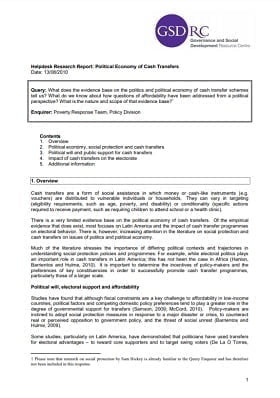Helpdesk Research Report: Political Economy of Cash Transfers
Cash transfers are a form of social assistance in which money or cash-like instruments (e.g. vouchers) are distributed to vulnerable individuals or households. They can vary in targeting (eligibility requirements, such as age, poverty, and disability) or conditionality (specific actions required to receive payment, such as requiring children to attend school or a health clinic). There is a very limited evidence base on the political economy of cash transfers. Of the empirical evidence that does exist, most focuses on Latin America and the impact of cash transfer programmes on electoral behavior. There is, however, increasing attention in the literature on social protection and cash transfers on issues of politics and political economy. Much of the literature stresses the importance of differing political contexts and trajectories in understanding social protection policies and programmes. For example, while electoral politics plays an important role in cash transfers in Latin America; this has not been the case in Africa (Hanlon, Barrientos and Hulme, 2010). It is important to determine the incentives of policy-makers and the preferences of key constituencies in order to successfully promote cash transfer programmes, particularly those of a larger scale.



